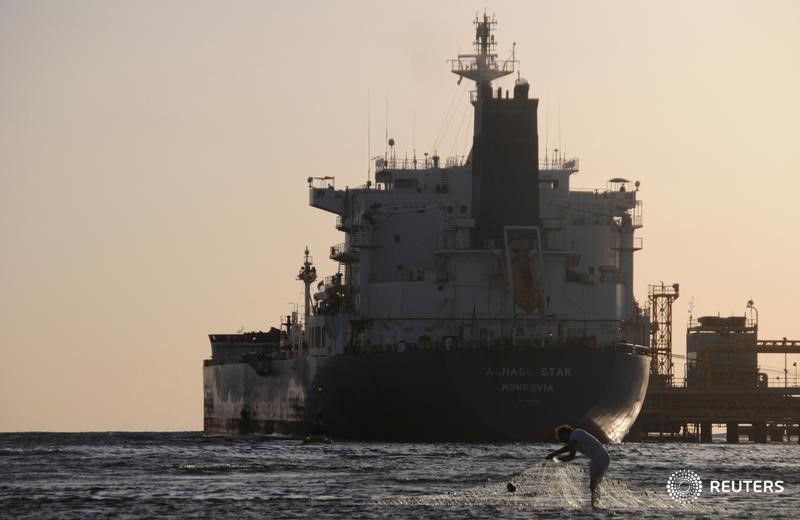US imposes sanctions on Russia’s leading tanker group Sovcomflot By Reuters
[ad_1]

© Reuters.
By Timothy Gardner and Daphne Psaledakis
WASHINGTON (Reuters) -The U.S. has imposed sanctions on Russia’s leading tanker group Sovcomflot as Washington seeks to reduce Russia’s revenues from oil sales it can use to support the invasion of Ukraine, the Treasury Department said on Friday.
Russia is one of he world’s top oil exporters and the sanctions were the latest in an effort by Western countries to add costs on the shipping of its and oil products while keeping the petroleum flowing to global markets.
The Treasury’s Office of Foreign Asset Control also designated 14 crude oil tankers vessels as property in which Sovcomflot has an interest.
OFAC issued general licenses allowing the offloading of crude oil, or other cargoes, from the 14 vessels for 45 days, and allowing transactions with all other Sovcomflot tankers.
“Sovcomflot as a whole, as a parent company, has been implicated in price cap violations in addition to deceptive activity,” a senior Treasury official told reporters in a call.
The sanctions freeze any U.S. assets of those targeted and generally bars Americans from dealing with them.
The G7, the EU and Australia imposed a $60 per barrel price cap on Russian oil in late 2022. It bans the use of Western maritime services such as transport, insurance and financing for shipments of oil priced at or above the cap.
“The designations today are basically intended to take some of their vehicles for doing that off the table, which is going to force them to invest more in spending, in creating new avenues for getting that oil out,” the Treasury official said.
The Western sanctions and the cap have forced some of Russian oil sales to rely on a so-called shadow fleet of aging tankers that ship consumers like India and China, much further than its traditional consumers in Europe. Treasury officials say those expenses reduce Moscow’s revenues that it can use for war.
The U.S. would not disclose what the specific violations Sovcomflot was accused of, the senior official said.
The official, however, added that the authority used for these sanctions relates to operating in the Russian maritime sector, reflecting the company’s work outside the price cap coalition.
Earlier on Friday, Washington imposed wide-ranging sanctions against Russia, targeting more than 500 people and entities to mark the second anniversary of Moscow’s invasion of Ukraine and retaliate for the death of Alexei Navalny, the Russian opposition leader.
The Treasury began enforcing the price cap in October, and before Friday had sanctioned 27 tankers for violating the price cap. Many of those tankers have been anchored off ports since being sanctioned, shipping data has shown.
Treasury said that the increased sanctions enforcement in recent months is forcing Russia to sell oil at a steeper discount to the international benchmark , limiting Russia’s revenue. The discount has widened to about $19 per barrel over the past month compared with $12 to $13 a barrel in October, it said.
[ad_2]
Source link

© Reuters.
By Timothy Gardner and Daphne Psaledakis
WASHINGTON (Reuters) -The U.S. has imposed sanctions on Russia’s leading tanker group Sovcomflot as Washington seeks to reduce Russia’s revenues from oil sales it can use to support the invasion of Ukraine, the Treasury Department said on Friday.
Russia is one of he world’s top oil exporters and the sanctions were the latest in an effort by Western countries to add costs on the shipping of its and oil products while keeping the petroleum flowing to global markets.
The Treasury’s Office of Foreign Asset Control also designated 14 crude oil tankers vessels as property in which Sovcomflot has an interest.
OFAC issued general licenses allowing the offloading of crude oil, or other cargoes, from the 14 vessels for 45 days, and allowing transactions with all other Sovcomflot tankers.
“Sovcomflot as a whole, as a parent company, has been implicated in price cap violations in addition to deceptive activity,” a senior Treasury official told reporters in a call.
The sanctions freeze any U.S. assets of those targeted and generally bars Americans from dealing with them.
The G7, the EU and Australia imposed a $60 per barrel price cap on Russian oil in late 2022. It bans the use of Western maritime services such as transport, insurance and financing for shipments of oil priced at or above the cap.
“The designations today are basically intended to take some of their vehicles for doing that off the table, which is going to force them to invest more in spending, in creating new avenues for getting that oil out,” the Treasury official said.
The Western sanctions and the cap have forced some of Russian oil sales to rely on a so-called shadow fleet of aging tankers that ship consumers like India and China, much further than its traditional consumers in Europe. Treasury officials say those expenses reduce Moscow’s revenues that it can use for war.
The U.S. would not disclose what the specific violations Sovcomflot was accused of, the senior official said.
The official, however, added that the authority used for these sanctions relates to operating in the Russian maritime sector, reflecting the company’s work outside the price cap coalition.
Earlier on Friday, Washington imposed wide-ranging sanctions against Russia, targeting more than 500 people and entities to mark the second anniversary of Moscow’s invasion of Ukraine and retaliate for the death of Alexei Navalny, the Russian opposition leader.
The Treasury began enforcing the price cap in October, and before Friday had sanctioned 27 tankers for violating the price cap. Many of those tankers have been anchored off ports since being sanctioned, shipping data has shown.
Treasury said that the increased sanctions enforcement in recent months is forcing Russia to sell oil at a steeper discount to the international benchmark , limiting Russia’s revenue. The discount has widened to about $19 per barrel over the past month compared with $12 to $13 a barrel in October, it said.